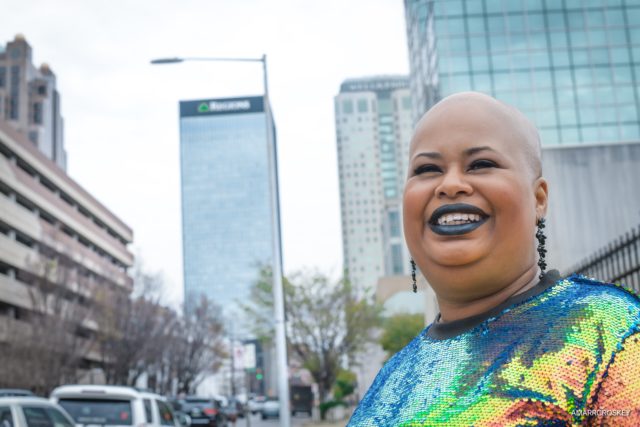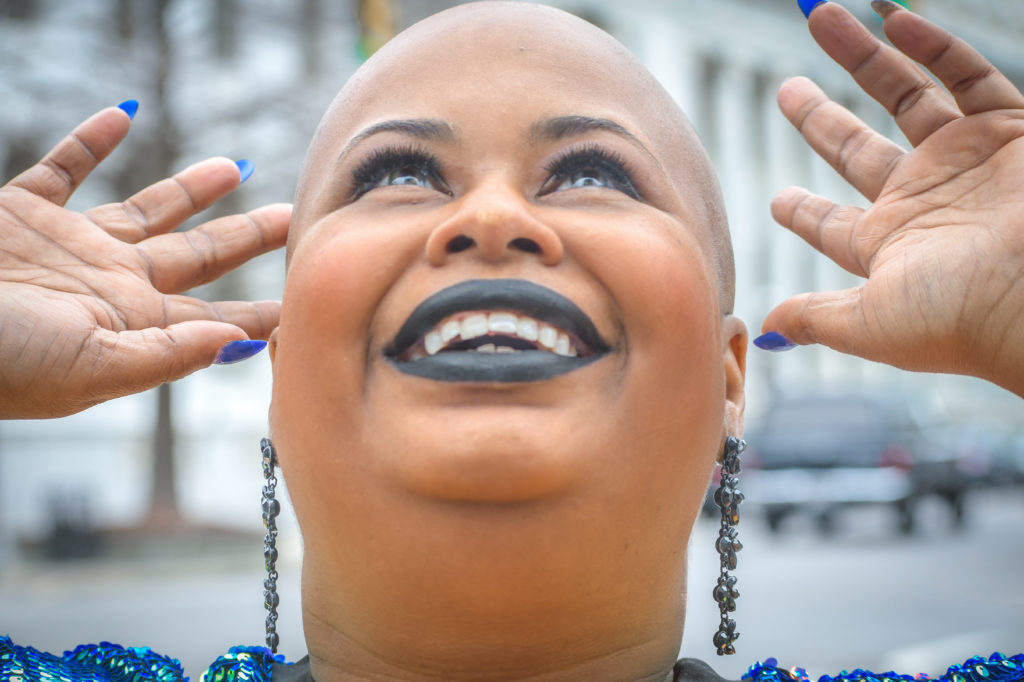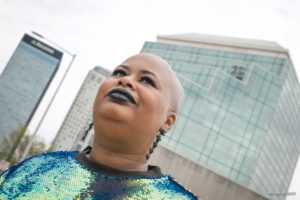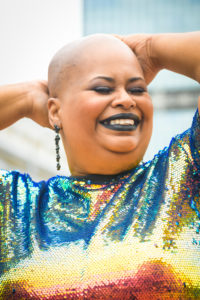
By Ameera Steward
The Birmingham Times
Deirdre Gaddis woke up one night in 2013 and decided to let it all go.
“I just got up out of the bed, went in the [bathroom], looked in the mirror, and started cutting away the hair I had,” Gaddis said. “Then I shaved my head and put my makeup on. … I took a picture, and I was like, ‘I’m still beautiful in spite of.’”
Gaddis, 45, has alopecia areata, a condition of losing hair in round patches—and her beauty shines through her many endeavors. She works as an administrative clerk by day, and in her spare time she sings, something she has done since she was four years old, when her great-grandmother gave her a piano.
Every three months, Gaddis performs at the Plum Bar downtown Birmingham; her next performance will be in late May or early June. Recently, she received a standing ovation for her performance at Satchmo’s Jazz Club in D’Iberville, Miss.
“My bald head is kind of like my signature now,” she said. “You will always find people that will have a problem with a woman having a bald head because the Bible even says in a scripture that a woman’s crown is her glory. Well, this is my crown. It just doesn’t come with hair.”
Gaddis is one of 31 women being featured each day this March on the city of Birmingham’s social media outlets for Women’s History Month. The profiles, which highlight women of all ages and various backgrounds, are part of Birmingham #StrongHER—a new campaign launched by Mayor Randall Woodfin to celebrate some of the unsung “sheroes’’ living, working, volunteering, attending school, or inspiring others across the Magic City. The message is that Birmingham is StrongHER, BoldHER, BrightHER, FierceHER, SmartHER, and BraveHER because of HER.
“A lot of people [associate] hair with beauty,’’ said Gaddis, a Birmingham native who’s the director of chorale ministries at Mount Zion Missionary Baptist Church in the Birmingham neighborhood of Zion City. “I’m just glad I can step out in my good clothes or jeans and T-shirts, not have anything on my head, and feel like I’m as beautiful as any other woman out there.’’
“Love Me for Me”

Being bald forces people to take her for who she is, as opposed to who they see. There is a difference between the two, Gaddis said: “I’m genuine, and I feel like you should love me for me, for who I am and not just because of what you see.”
Before she shaved her head, Gaddis would be embarrassed to go into the beauty shop because “you would never know I had the struggle I had because it was so well hidden.”
“When you have to sit in that chair, and they take the tracks out and you get up [with] little sprigs around the back and around the side [of your head], …you get the stares and the looks,” she said. “It’s rougher than just having the bald head.”
Gaddis was tired of hiding, just like anyone who does not live in their truth.
“Say, if you’re a lesbian or if you’re a homosexual man and you’re trying to hide who you are to please other people, the release you get from being able to walk in your truth is amazing,” she said.
Waking in Your Truth
Gaddis added that many don’t understand the stigma and emotional baggage that comes along with not living in your truth.
“For me, it’s my hair and my head, and it enabled me to be a stronger person, a stronger woman, an individual who didn’t let the stares get to her anymore,” she said. “Some people still stare, but sometimes it’s for all the right reasons.”
For instance, one day she was in a [super center] and a little girl kept nudging and poking her mother and said, “Mommy, she looks like a baby doll.”
“I almost cried right there … because I was expecting that little kid to say something ugly,” Gaddis said. “I was trying to cover up a problem, … hide a defect. In hiding the defect, I was disguising my beauty. … Once I let me come out, everything turned out for the better.”
Gaddis said being bald is “a walk.” People will see her wearing a wig one day, and they may not even realize who she is if she decides to be free the next, “because they’re looking for the hair; they’re not looking for the person.”
When she first shaved her head, even some close to her had issues. In one relationship, the man she was with said things like, “I’m the only one that knows the real you, and I’m the only one that accepts you as you are. … Everybody sees you with the hair, and all you’re known for is your hair.”
“It just made me focus more on my inner strength and focus more on what I thought to be beautiful and not so much as what other people thought,” Gaddis said. “When the guy said, ‘Ain’t nobody else gone love you like I will when they find out you’re bald,’ that is the type of mentality that keeps a lot of [women’s] self-esteem low. I don’t have that problem anymore because I decided I was gonna walk in my truth.”
Family History of Alopecia
Gaddis was born and raised in Birmingham, around the North Roebuck area. She has three siblings and a family with a history of alopecia. Although her mother has a head full of “thick, beautiful hair,” Gaddis said, alopecia is present in almost every generation on her side of the family.
Gaddis graduated from John Carroll High School in 1992, and around the late 1990s started experiencing hair loss at the back of her scalp, but the hair came back. Ten years ago, in 2009, she said her hair started thinning again in the back so she tried to wearing weaves and extensions, which can get expensive.
In 2012, when she was getting ready to attend college, her finances weren’t where she needed them to be because she had left a full-time county job and enrolled as full-time student at Miles College in August 2012 on a full Presidential Scholarship. No longer working full-time had significant impact on her finances.
“I was used to spending money like I wanted, when I wanted, but those days were over once I started school,” said Gaddis, who toured as a singer while in school and became known as the “Voice of Miles College.”
Freedom

When Gaddis decided to shave her head, she felt financial and emotional freedom. She also got encouragement from her choir director Dr. Bernard Williams Sr., who passed away in 2014. She told him she had to shave her head because she didn’t want it anymore and didn’t have the money to keep getting it done, “and he said, ‘You’re still beautiful regardless. You’re still a queen. You’ll always be a queen. Don’t be ashamed. … Girl, go ahead.’”
“That right there gave me one of the biggest releases ever because I was concerned about what people would say and what people would think,” Gaddis recalled. “To know that he supported me and that he encouraged me to walk in my truth enabled me to hold my head up a little bit higher and continue to shave my head.”
Gaddis performed regularly at Miles, as well as for church programs. She went to Selma, Ala., for the 2015 BET Selma50 Celebration, during which she performed the song “Glory” with John-Mark McGaha and G.I. Magus as the Birmingham Trio. She also sang at former Birmingham Mayor Larry Langford’s funeral on Jan. 14, 2019.
At Miles, Gaddis studied criminal justice—she graduated in 2015—and during those years realized she had to battle alopecia and perceptions. Some people would think she was sick or going through something that made her hair fall out. She added that, yes, she has alopecia, but “I’m not sick.”
“I’m not a cancer survivor, but I’ve been able to encourage other women who face that fight and are struggling with their impending baldness,” Gaddis said. “I can show them that being bald isn’t a drawback. In fact, baldness forces others to focus on your true inner beauty instead of the hairdo you’re wearing at the moment.
“You have to be your own validation. You have to live by your own truths. When you try to be what other people think is beautiful or what other people think is grand, you end up selling yourself short.”
A Survivor of Life

Gaddis’s shaved head has provided strength in her personal life, as well. She is a survivor of domestic abuse. She married in 1998, and her son Julian was born in 1999. She said she was beaten on the day she went into labor in August of that year, and her divorce was finalized in 2001.
“Shaving my head gave me a lot of courage. It gave me a lot of strength,” Gaddis said. “It heightened my self-esteem because I could be beautiful and I could be operating in my truth and not try to hide what my truth was and not try to dress it up for somebody else.”
Gaddis wants women who are going through many of the things she’s faced to not give up.
“I’m just … hopeful that what I’m going through or what I’ve been through can inspire somebody else to walk in their truth, to embrace whatever it is that their struggle is,” she said. “If it’s being bald, go ahead be bald and be beautiful.”
Gaddis continues to inspire others, including people she looked up to like Rosa Nell Harry, a cosmetologist from her home church, Mount Zion Missionary Baptist Church.
“Now she actually wears her hair real low,” Gaddis said. “She said she shaved her head because I inspire her, and I look pretty with it, and she wanted to look pretty too. Do you know how that made me feel? Because … this woman I’ve admired for being just beautiful all my life said she admired me?”
To see other profiles, please visit www.birminghamal.gov/strongher.
Birminghamal.gov contributed to this article.
To read how Madelaine Bowie is empowering Ensley residents, click here.



